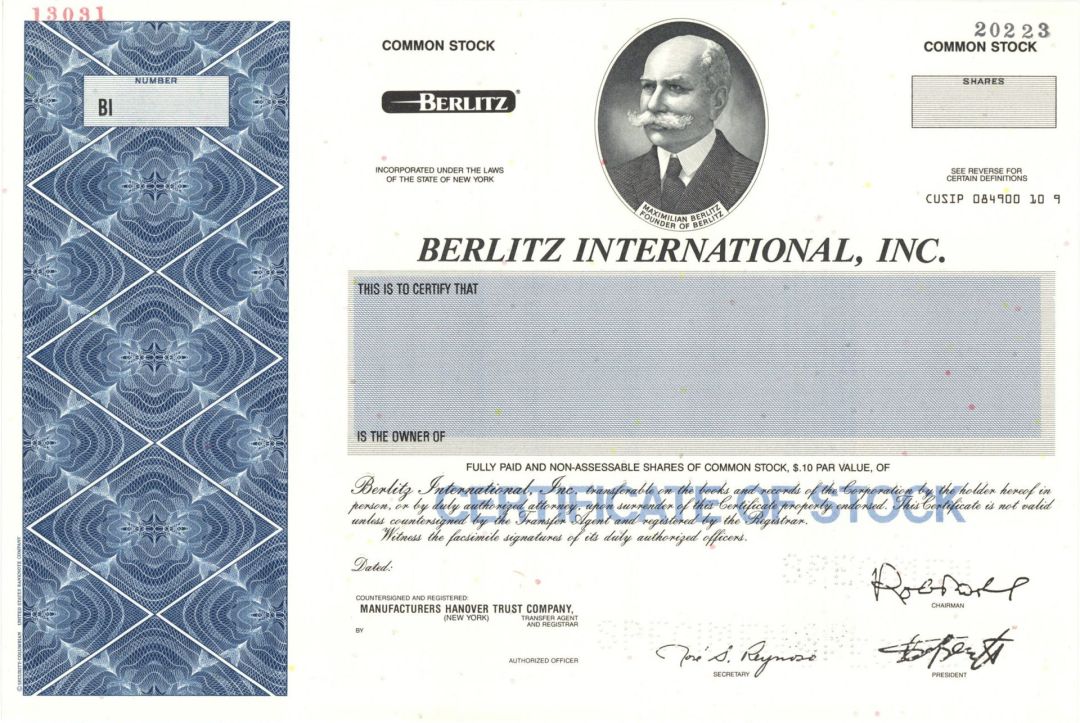Berlitz International, Inc. - Specimen Stock Certificate
Inv# SE3832 Specimen StockSpecimen Stock printed by Security-Columbian United States Banknote Company.
Berlitz International Inc. is a languages services firm providing language instruction, cross-cultural training, translation services, and publishing products in 50 countries. For language instruction, the company employs its proprietary Berlitz Method, which avoids tedious memorization exercises and grammar drills in favor of a conversational, usage-driven approach to virtually all living languages. Berlitz's publishing division produces pocket-size travel guides and language phrase books, as well as bilingual dictionaries, trade paperback travel guides, and self-teaching language guides from audio cassettes to interactive compact discs. The company's translation services provide technical translation, interpreting, software localization, electronic publishing, and other services that are related to foreign languages.
Berlitz's origins date back to 1872, when 20-year-old Maximilian D. Berlitz emigrated from Germany to America in 1872 to teach Greek, Latin, and six other European languages. Employing the traditional grammar-translation approach, he served as a private instructor for several years, then, in 1878, accepted a position as professor of French and German at the Warner Polytechnic College in Providence, Rhode Island. The position turned out to be nothing less than immediate ownership of the 'college,' where he also served as dean, principal, and sole faculty member. In desperate need of an assistant, Berlitz hired Nicholas Joly directly from France, based solely on a letter of application. When Joly arrived in Providence, Berlitz was surprised to learn that his new assistant spoke no English. To make matters worse, Berlitz had fallen ill from the strain of running the school alone and was unable to teach for several weeks. Joly had no choice but to take over and conduct classes strictly in French, instructed by Berlitz to name objects and act out verbs, essentially, to make the best of it. When Berlitz recovered, he discovered that the students had made remarkable progress in French. Berlitz's main tenet of language instruction--the transfer of usage by actually using no language other than the one being studied--thus gained credibility, sparking development and fine-tuning of the young school's trademark pedagogy, the Berlitz Method. Though Berlitz was convinced that his 'direct' method of language instruction was the most effective available, the public and academic community at first viewed it with suspicion. Starting with the first greeting by the instructor, the Berlitz Method dictated that only the target language was to be spoken in class. The method emphasized the spoken word, with students learning to read and write only what they had already learned to say and understand. In the place of formal grammar instruction, students absorbed a grammatical system naturally, by using it. Above all, to develop fluency, students learned to think in the new language, not to translate&mdashø associate new words with objects and ideas, rather than with the distractingly familiar words of their mother tongue. To encourage students in the use of the target language, instructors typically employed question-and-answer techniques to prompt dialogue while expanding vocabulary. However unconventional, the young company, known as the Berlitz School of Languages, produced results that simply couldn't be ignored. Berlitz opened his first language center in Boston in 1880, followed soon after by centers in New York City and Washington, D.C. He then expanded to other American cities as well as Europe. By the turn of the century, an explosive tourist industry prompted Berlitz to develop travel guides, self-teaching materials, and interpretation services to meet this growing demand. Berlitz died in 1921, but the company he founded, and his method, were carried on by his son-in-law and associate, Victor Harrison. Victor Harrison, Jr., briefly assumed control in 1932, but was replaced by a long-time Berlitz employee, Jacques Strumpen-Darrie, who guided the company for 20 years, before his son, Robert, took charge. The younger Strumpen-Darrie ran Berlitz until his retirement in 1970, even after the company was sold to Macmillan in 1966. Read more at https://www.referenceforbusiness.com/history2/85/Berlitz-International-Inc.html
Stock and Bond Specimens are made and usually retained by a printer as a record of the contract with a client, generally with manuscript contract notes such as the quantity printed. Specimens are sometimes produced for use by the printing company's sales team as examples of the firms products. These are usually marked "Specimen" and have no serial numbers.










Ebay ID: labarre_galleries